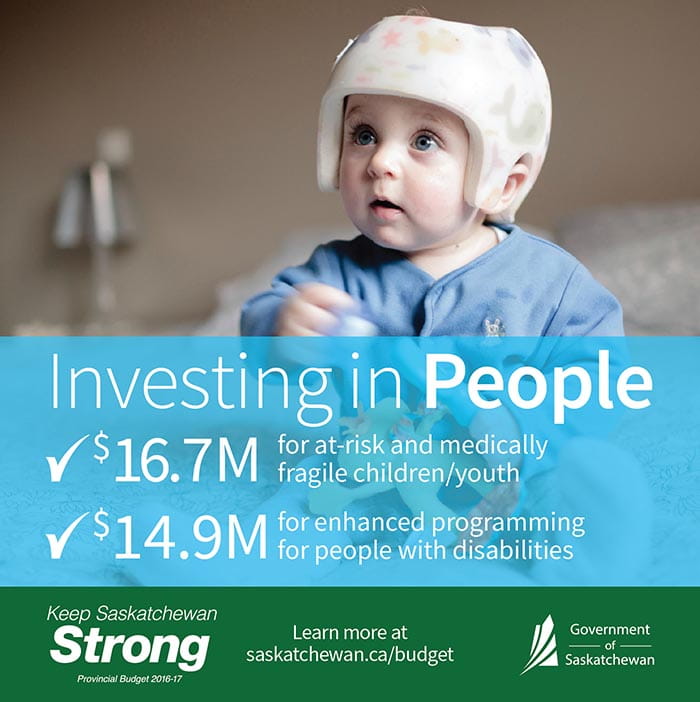Released on June 1, 2016
Saskatchewan people in need will continue to benefit from the province’s investment in programs for children, youth and families, people experiencing disabilities, and people needing income assistance and housing. Social Services’ 2016-17 Budget is $1.052 billion, a 5.1 per cent increase from last fiscal year.
“Since we were first elected in 2007, our government has demonstrated our commitment to helping the province’s most vulnerable,” Social Services Minister Donna Harpauer said.
“Especially in challenging economic times, it is vital that we continue to invest in people to keep Saskatchewan strong.”
At-risk children, youth and their families will benefit from a $16.7 million investment, including:
- $7.9 million for medically fragile children and those with complex needs;
- $5.7 million for foster care and extended family care;
- $2.3 million in preventative services to keep children from coming into the care of the ministry; and
- $0.8 million for Assisted Adoption.
This investment will allow the ministry to continue its work on Child Welfare Transformation and to maintain a focus on prevention and keeping children safely at home with their families.

In response to the Saskatchewan Poverty Reduction Strategy, Social Services is undertaking a redesign of its income assistance programs to simplify administration, improve client service and support transitions to independence and participation in the economic and social life of the province.
The province is continuing its commitment to make life better for people experiencing disabilities:
- $210 million will be dedicated to the Saskatchewan Assured Income for Disability (SAID) program for people with significant and enduring disabilities;
- $3.4 million will address the emerging needs of those with intellectual disabilities and support the transition of individuals from Valley View Centre as homes and programs become available; and
- work on a third assessment and stabilization home – part of the safety net of supports for people with intellectual disabilities – will begin.
Government’s next steps on the Saskatchewan Disability Strategy will focus on the Where to Start actions identified in the strategy, as well as six priority areas identified by community members:
- accessible and safe transportation so people can participate in their communities;
- respite to help families and caregivers get a break from their caregiving role;
- accessibility legislation to create more inclusive communities;
- residential services to help people live in their homes and communities;
- service co-ordination and navigation so people can find disability services when they need them; and
- awareness and understanding of the rights of people experiencing disabilities so all citizens have a greater understanding of and respect for their rights.
These initiatives have begun, and efforts are under way to establish measures, targets and public reporting on progress.
Social Services’ Budget for 2016-17 provides $494 million for income assistance programs (including SAID) that help more than 30,000 individuals and families to meet their basic needs. This investment includes $36.5 million for the Transitional Employment Allowance (TEA), an increase of $19.5 million over last fiscal year. In 2015, a procedural change directed all new fully employable applicants to TEA, rather than some to the Saskatchewan Assistance Program (SAP), resulting in more targeted and streamlined services for fully employable clients. Some program changes will be introduced in this fiscal year to increase fairness and equity among clients and enhance the sustainability of the programs, while ensuring that vulnerable citizens receive the supports they need.
The 2016-17 Budget also includes $3.8 million for housing programs. The Saskatchewan Housing Corporation will support the Disability Strategy, Poverty Reduction Strategy and Mental Health and Addictions Action Plan by focusing on accessible, affordable housing for those most in need.
-30-
For more information, contact:
Trish Alcorn
Social Services
Regina
Phone: 306-787-0916
Email: trish.alcorn@gov.sk.ca
Cell: 306-536-1479

